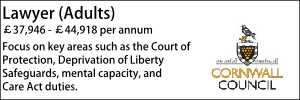

The final say
News
Must read
Families refusing access to support
Features Test

Producing robust capacity assessments and the approaches to assessing capacity

Disability discrimination and proportionality in housing management

Cross-border deprivation of liberty

Dealing with unexplained deaths and inquests

Court of Protection case update: May 2025
Features

Producing robust capacity assessments and the approaches to assessing capacity

Disability discrimination and proportionality in housing management

Cross-border deprivation of liberty

Dealing with unexplained deaths and inquests

Court of Protection case update: May 2025
Sponsored articles
What is the role of the National Trading Standards Estate & Letting Agency Team in assisting enforcement authorities?
Webinars
Is Omeprazole the new EDS?
More features
Provision of same-sex intimate care
Court of Protection case update: April 2025
High Court guidance on Article 3 engagement in care at home cases
‘Stitch’, capacity and complexity
Issuing proceedings in best interests cases
Court of Protection case law update: March 2025
The Health and Social Care (Wales) Bill Series – Regulation and Inspection of Social Care
The Health and Social Care (Wales) Bill Series – Direct Payments for NHS Continuing Healthcare
What is the right approach to Care Act assessments?
Disabled people in immigration bail: the duties of the Home Office and local authorities
Capacity, insight and professional cultures
Court of Protection update: February 2025
Setting care home fees
Could this be the end for local authority-provided residential care?
“On a DoLS”
It’s all about the care plan
Court of Protection case update: January 2025
Mental capacity and expert evidence
Best interests, wishes and feelings
Capacity, sexual relations and public protection – another go-round before the Court of Appeal
Court of Protection Update - December 2024
Fluctuating capacity, the “longitudinal approach” and practical dilemmas
Capacity and civil proceedings
Recovering adult social care charges via insolvency administration orders
Court of Protection case update: October 2024
Communication with protected parties in legal proceedings
The way forward for CQC – something old, something new….
The Ombudsman, DoLS and triaging – asking the impossible?
Outsourcing and the Human Rights Act 1998 – the consequences
Commissioning care and support in Wales: new code of practice
Tories to give councils extra powers and funds to tackle health issues
- Details
Local authorities will be given the powers and budget to bring about real improvements in local public health, the Conservatives have vowed.
The promise was contained in a green paper on public health – A Healthier Nation – published this week. The paper said: “Local authorities have already been assigned statutory duties to work towards improving public health, and some work well in partnership with primary care trusts. But these duties are not enough.”
The move would be part of a drive to decentralise responsibility for improving public health as far as possible away from central government control and out to local communities.
“We need a system in which local communities – working with other institutions (employers, charities, social entrepreneurs, private providers, schools and local doctors and nurses) – can identify local needs and provide rigorous solutions that are tailored to local circumstances,” the green paper said.
The Conservatives added that it would not dictate to local communities how they achieve better public health outcomes, and would reward them for the results they achieve “when they make serious savings for the NHS and the taxpayer”.
The party proposed taking “immediate action” if it wins the election, including:
- Localised funding: the public health budget will be separated from the budget for NHS services and much more of it devolved to local authorities and their health service partners. This will include public health success payments for tackling problems such as infant mortality, childhood obesity and sexually transmitted infections, and financial rewards for reducing the future burden of disease and cost
- Freedom to innovate: local directors of public health will manage budgets and will be obliged to commission local bodies, like schools, businesses, councils and GPs, to promote healthy living
- Local action to tackle inequalities: a new ‘health premium’ will be introduced to target resources towards areas with the poorest health to reduce chronic health inequalities
- New roles for GPs and local pharmacists in promoting better public health locally.
Other measures include a tougher licensing regime to tackle problem venues which encourage irresponsible drinking, a ban on cheap alcohol being used as a loss leader in shops and supermarkets, and a clearer system of alcohol labelling.
The role of the Department of Health would also be redefined “completely”, with a new name – the Department of Public Health – and a greater focus on prevention than cure of disease.
Shadow Health Secretary Andrew Lansley said: “Much greater responsibility for tackling problems like obesity, drug use and teenage pregnancy will be devolved to communities on a new payment-by-results basis, with extra rewards for improving the public health of the poorest.”
Senior judge calls for media access to Court of Protection
- Details
The most senior judge at the Court of Protection has come out in favour of allowing media access, subject to reporting restrictions.
Denzil Lush told The Times: “I don’t have a problem with the media being present. There would, however, have to be anonymity for the vulnerable elderly people involved, the details of whose financial affairs were being exposed. I don’t think they would want that all over the newspapers.”
He added: “Probably there should be a change in emphasis, to bring the Court of Protection in line with the family courts.”
The judge also warned that abuse of the mentally vulnerable was on the increase, and this type of case amounted to 10-15% of its workload.
Lush’s comments come a month after the President of the Family Division, Sir Mark Potter, announced a review of the way the Court of Protection operates after complaints about its practice and procedure and because of its higher than expected caseload.
The ad-hoc committee conducting the review is being chaired jointly by Mr Justice Charles and Mrs Justice Proudman and will be made up of members of the legal profession and other court users.
The Times also reported that a test case is imminent over media access to the court, relating to a hearing involving a severely disabled adult. Mr Justice Hedley granted permission in November for the media to attend hearings, but the Official Solicitor is calling for them to remain private, the newspaper said.
Surge in use of Independent Mental Capacity Advocate service
- Details
The number of people receiving representation from the Independent Mental Capacity Advocate (IMCA) service rose by 27% in its second year of operation to 6,582, research has revealed.
Set up under the Mental Capacity Act 2005, the service represents and supports people without capacity, and mainly without family or friends to support them, in important decisions. The Act also introduced a legal duty on NHS bodies and local authorities to refer eligible people to the service.
More than half (3,496) of the IMCA service’s representations for 1 April 2008 to 31 March 2009 related to accommodation moves – an increase of 14%. However, much greater growth was seen in relation to care reviews (up 102% to 387), decisions about serious medical treatment (up 43% to 968) and adult protection proceedings (an increase of 29% to 960).
The Department of Health said it was pleased at the increase in referrals as it was a sign of greater awareness of the IMCA service. But, the report added, “at the same time, a greater rate of increase had been expected, and it is not thought that the IMCA service is reaching all the people it needs to as yet”.
Key areas of concern include continuing low levels of referral for serious medical decisions in the NHS and the low level of adult protection referrals. “It is not clear that local authorities understand they must consider for each adult protection referral received whether the individual would benefit from an IMCA,” the report found.
The researchers also pointed to large variations between different geographical areas, both in relation to total number of referrals and numbers of referrals for serious medical conditions.
A study of stakeholder experiences found that MCA leads in local authorities were positive about the professionalism of advocates and the benefits to their clients. This was in contrast to the NHS where there were concerns that involving an IMCA would lead to delayed treatment. There were also calls for advocates to be more available and to deliver IMCA reports faster.
High Court upholds challenge to Barnet and Portsmouth service changes
- Details
A High Court judge has quashed plans by the London Borough of Barnet and Portsmouth City Council to change the way they provide support to people living in sheltered accommodation.
Barnet had sought to terminate contracts for on-site warden based services and in its place develop a peripatetic support service with the retention of an alarm service. The initiative was expected to save the council some £400,000 a year.
Five claimants – two of whom were disabled within the meaning of section 1 of the Disability Discrimination Act 1995– argued that Barnet had failed to fulfil its statutory duties under section 49A(1) of that Act. They also claimed that the council had neither followed its own equality scheme (because it did not sufficiently involve disabled persons or groups representing their interests in the decision-making process), nor followed the Disability Rights Commission's statutory code in assessing the impact of the proposals.
Barnet rejected the claims, insisting that it had complied with its duty under the 1995 Act in substance and had carried out a robust consultation exercise. The London borough also said there was no duty to carry out a full equality impact assessment.
In the Portsmouth case, the cabinet member responsible for housing decided to terminate the provision for sleep in, night-time staff at each of its category 2.5 sheltered housing schemes and replace it with a mobile night service. A preliminary impact assessment had been conducted by a policy development manager in the council’s housing service, who concluded that the changes would have no adverse effect or impact on members of equality groups, including disability groups. The council's scrutiny committee subsequently approved the decision.
In this instance, the claimant was in his mid-sixties, registered blind and with mobility and other health issues. Portsmouth rejected similar claims to those in the Barnet case that it had breached its duties.
Judge Milwyn Jarman QC ruled that while the decision-makers in the two cases may have had a general awareness of their duty under the 1995 Act, this “does not amount to a substantial rigorous and open-minded approach”. Although in each case the residents concerned – including those with disabilities – were questioned and consulted, this was part of an approach to residents as a whole, he said.
The judge added that while both councils had some regard to the impacts on residents as a group, “neither authority in my judgement had any or sufficient regard to such an impact upon those residents with disabilities as a separate group or to the need to recognise that the taking into account of those disabilities may involve treating disabled persons more favourably than others.”
He added that references in the documentation before the decision-makers in each case to disabilities or to rights of equality “do not fulfil the requirement of such recognition. Nor does a general awareness amongst officers or decision-makers of the duty under section 49A(1).”
The judge found that Barnet’s consultation exercise “amounted to the sort of involvement envisaged by the DES (Disability Equality Scheme)”, but “the same cannot be said of Portsmouth”. The latter’s exercise, which failed properly to involve the residents affected, was “inadequate”.
He added: “I have come to the conclusion that the failings in each case are sufficiently serious for the decision to be quashed and for the matter to be reconsidered.”
In a statement, Barnet welcomed the judge’s findings on the extent of its consultation, and pointed out that the majority of complaints were either abandoned by the claimants or rejected by the court.
“However, the judgment suggests that a council has to demonstrate that every member, not just officers, involved in the decision making gave full and stated consideration to all relevant legislation and guidance,” it said. “This raises profound issues for the working of local government.”
The council also warned that reform, which is vital in the current economic circumstances, “could become almost impossible” and that “every reform has the potential to become a protracted legal challenge”.
Barnet will meet with lawyers later this week with a view to lodging an appeal. “The pressing need to reform our warden service, which reflects an outdated and unbalanced model of supporting older people, and is not available to people who remain in their own homes, is as strong as ever,” it said. “The status quo is as open to challenge as any change.”
New fund to provide volunteering boost
- Details
A number of fresh initiatives have been launched this week to strengthen investment in volunteering and to help protect the rights of volunteers.
The Department of Health has launched the Health and Social Care Volunteering Fund, which is intended to bring a new focus on volunteering projects in the NHS and social care by managing the grants system centrally. The fund replaces the Opportunities for Volunteering (OFV) scheme.
The fund will be managed by a new partnership including leading national third sector bodies, Attend, Community Service Volunteers (CSV) and Prime Timers working with ECOTEC.
According to the Department of Health, the fund’s central administration means it will be more thorough in promoting best practice for partnerships between the NHS, social care and third sector organisations. The fund also seeks to strengthen the bonds between local commissioners and third sector organisations, by evaluating the success of all funded projects and sharing new learning and good practice. Under the new fund model any third sector organisation can apply for funding.
Care Services Minister Phil Hope said: “This new funding system will offer more scope for national projects in areas such as obesity, smoking and young people’s health. It will make our money work harder by opening up funding opportunities to more organisations.”
Carolyn Hay, on behalf of the partnership that will manage the fund, said the four partners have a wealth of third sector experience and extensive grant management expertise. “We see this as a fantastic opportunity for all involved to build a positive future for volunteering in health and social care," she said.
The new fund will run concurrently with the OFV until 2012, to allow projects already being funded to run their course. Applications for grants under the new arrangements will open in January 2010.
Volunteering England, the volunteer development agency, is meanwhile calling for evidence in January 2010 for its volunteer rights inquiry panel.
The panel has been set up with three objectives: to clarify the rights and protections that exist for volunteers and dispel employment myths; to promote good practice in the management and governance of volunteering; and to explore different models of redress when things go wrong.
The chair of the panel, Sukhvinder Kaur-Stubbs, said it had agreed volunteering should be maintained as an activity distinct from paid employment.
“Volunteers do have certain rights and protection under current law,” she said. “However, the over-riding concern was that volunteers did not demand equal employment rights but parity of esteem. This is as much about being treated with dignity, respect and fairness, as it is about proper management and good governance.”
Reforms to Vetting and Barring Scheme planned after Singleton report
- Details
The new vetting and barring scheme covering England, Wales and Northern Ireland is to be watered down after the original proposals produced a deluge of complaints that it was too bureaucratic and would deter genuine volunteers.
The Children’s Secretary said he had accepted all of the recommendations contained in a report by Sir Roger Singleton, the chief adviser on the safety of children and chairman of the Independent Safeguarding Authority. Ed Balls had commissioned a report into whether the line was drawn in the right place for registration under the scheme.
In his report, Drawing the Line, Sir Roger recommended that private arrangements between parents and friends should continue to remain outside the scheme. However, where an organisation makes the decisions on which adults should work with their children then the requirement to register will apply.
Other significant recommendations include a proposal that the “frequent contact test” should be met if the work with children takes place once a week or more. At present the test is if activity happens as often as once a month. The report adds that the "intensive contact test" should be met if the work takes place on four days in one month or more or overnight.
In addition, invidividuals who go into different schools or similar settings to work with different groups of children will not be required to register unless their contact with the same children is frequent or intensive.
A review will also be undertaken into the minimum age of registration for young people engaging in regulated activity as part of their education, while the government will immediately change the rules so that 16 to 18-year-olds in education are not required to register.
It is estimated that implementing the changes will mean that the number of people required to register will fall from 11 million to nine million. The timing of the scheme’s rollout will not be affected.
Ed Balls said: “Keeping children and young people safe is a top priority for Government and a robust vetting and barring system that prevents people who are known to be a threat working with them is crucial to that. But we also need to make sure that we draw the line in the right place and that we do not interfere in private arrangements that are rightly made between friends and family.”
Further reviews proposed by Sir Roger and adopted by the government will cover the continuing need for “controlled activity” and the law on when those workers who already have ISA registration will have to get CRB checks.
Page 268 of 270
Locums
Case Law Update

The final say
In association with...

Poll
in association with...

Events

Directory































